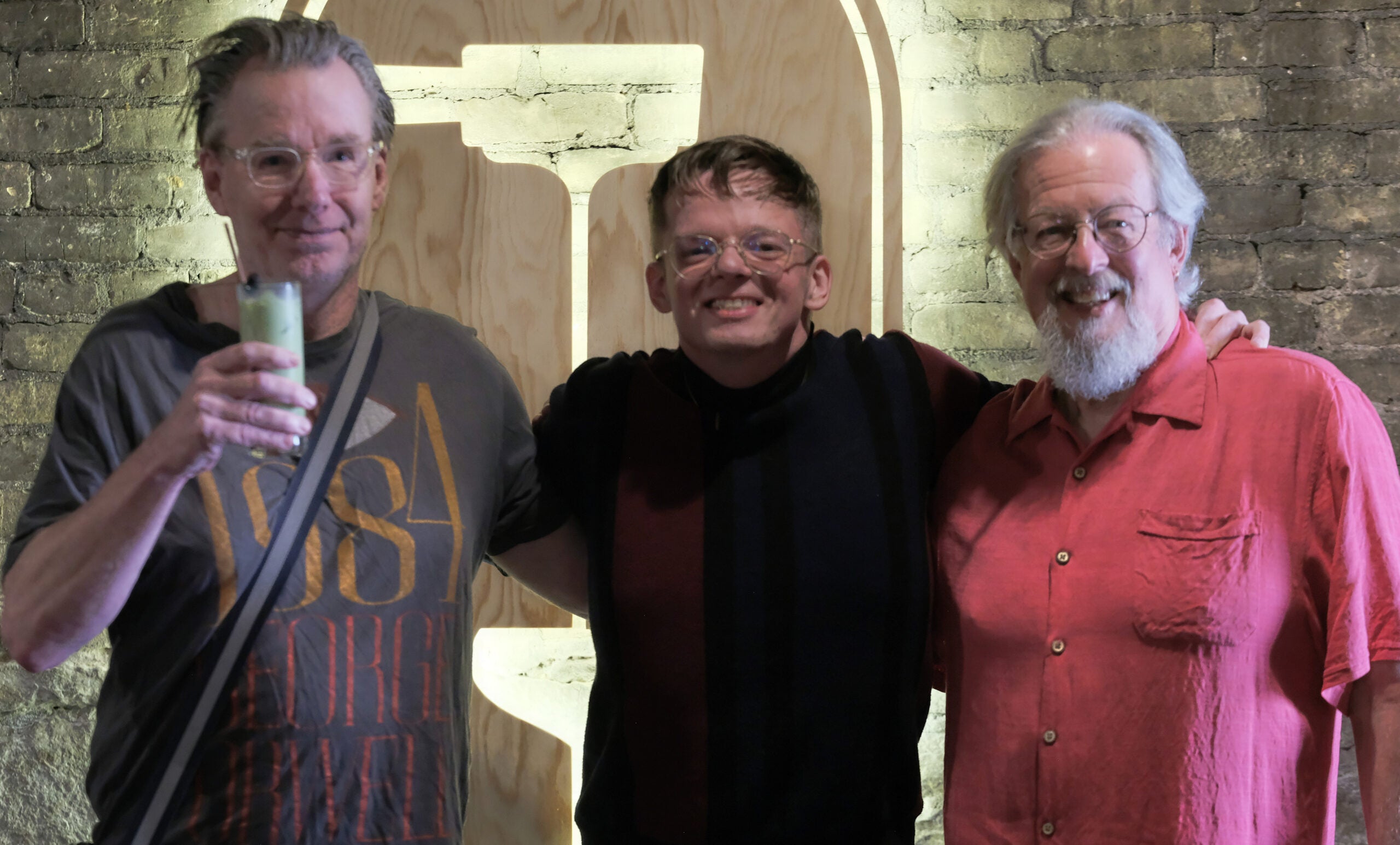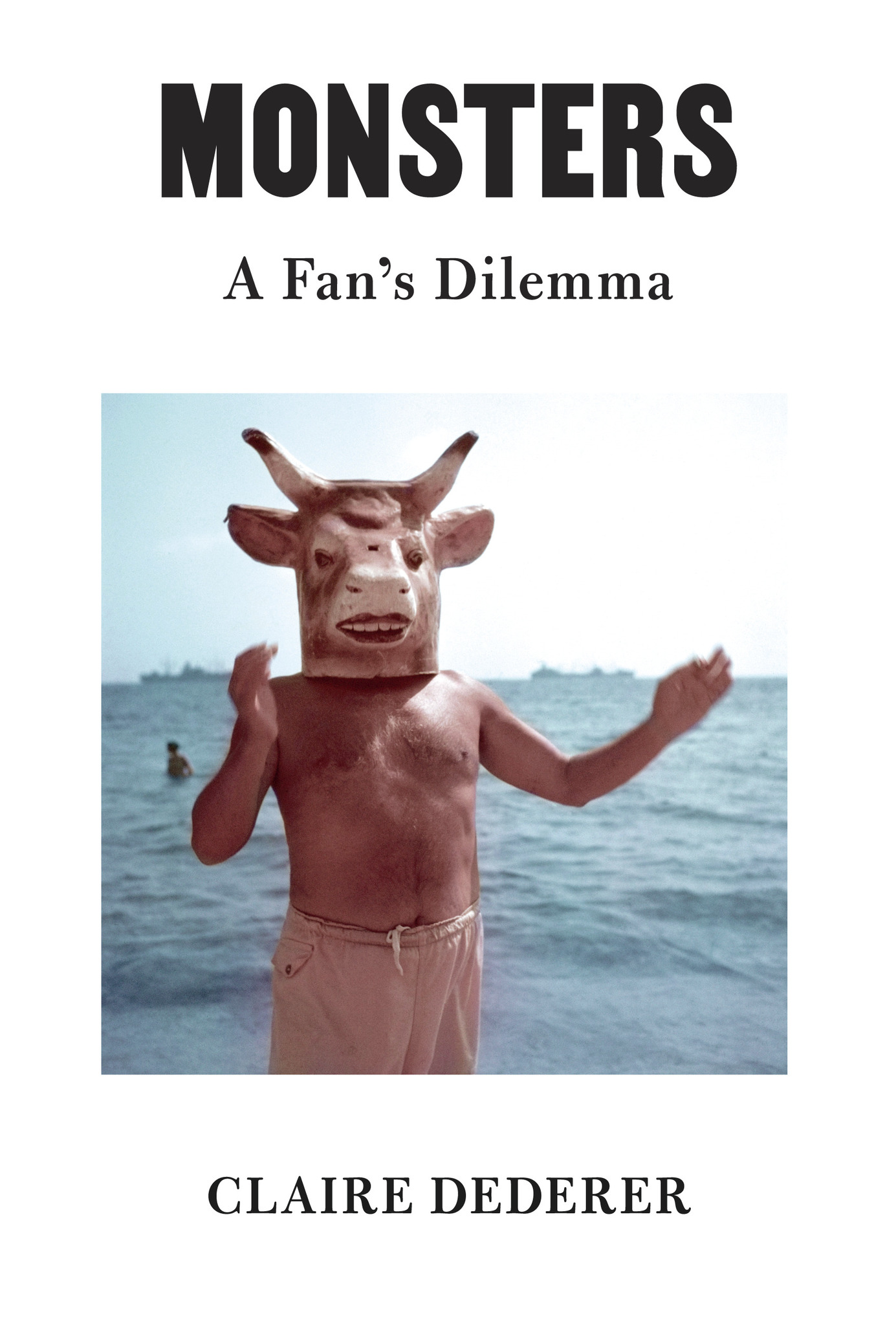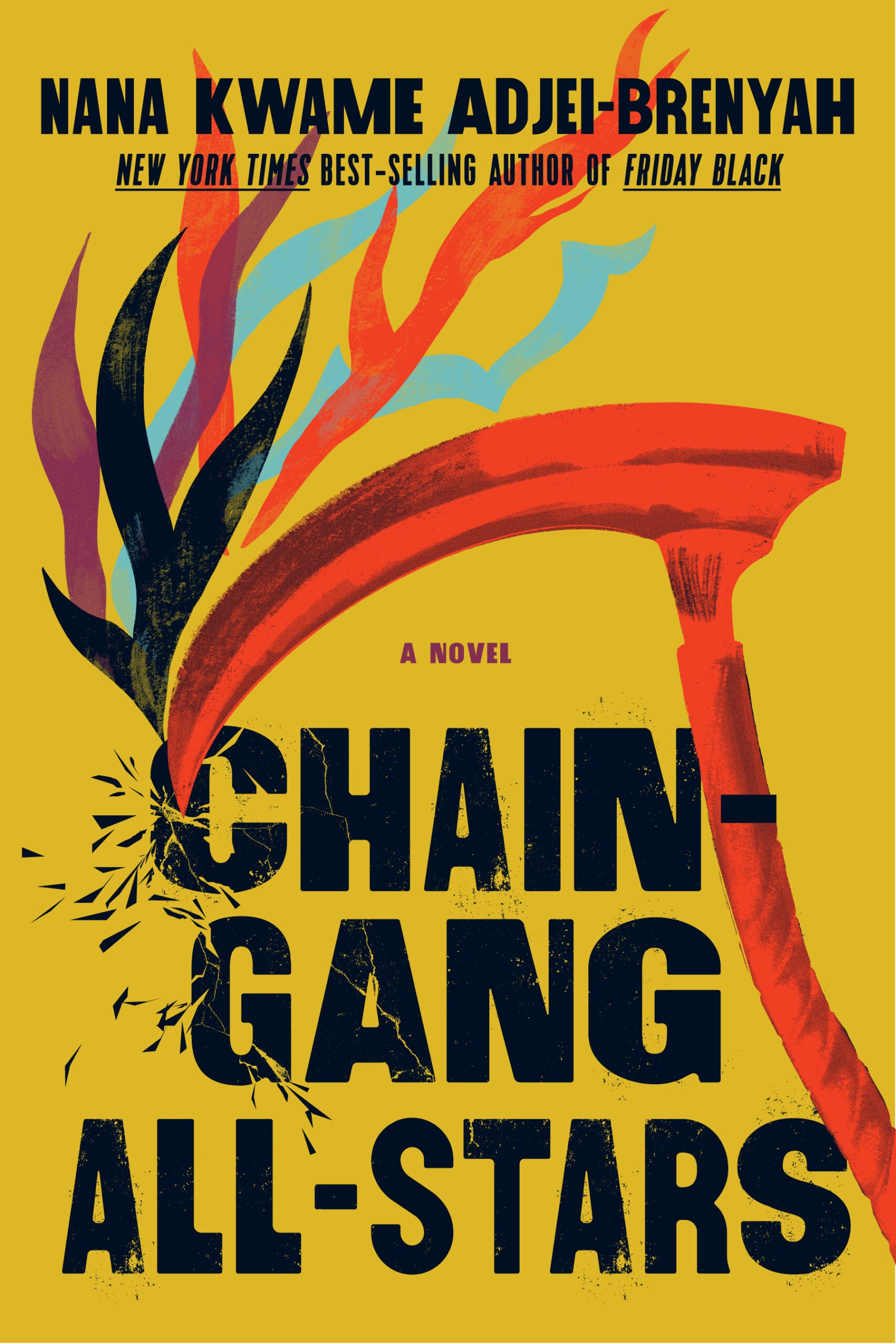Barista and mixologist Ryan Castelaz on how he’s reinventing the coffee experience. Also, writer Claire Dederer contemplates whether it’s possible to hate the artist but still love the art. And the ‘New York Times’ best-selling author Nana Kwame Adjei-Brenyah on his debut novel, ‘Chain-Gang All-Stars.’
Featured in this Show
-
Wisconsin's Ryan Castelaz on the synchronicity of telling stories and creating coffee concoctions
Coffee has come a long way, and barista and mixologist Ryan Castelaz is playing a big part in this continuing evolution.
Originally from New Berlin, Wisconsin, Castelaz is known as the “Dean of the Demitasse.” Well, he is now that I’ve referred to him as that.
Castelaz is the founder of two Discourse Coffee Workshops. He started out in Sister Bay. Now, he has moved to the sugar and cream city of Milwaukee.
Castelaz is sharing his love for java with his book, “The New Art of Coffee: From Morning Cup to Caffeine Cocktail.”

The cover of Ryan Castelaz’s book, “The New Art of Coffee: From Morning Cup to Caffeine Cocktail.” Photo courtesy Kevin Miyazaki He believes you can tell stories with coffee. For example, he created a drink called “The Don” named after Marlon Brando in “The Godfather.”
I traveled to Discourse in Milwaukee to find out more. The result was a suitably caffeinated conversation with Castelaz. He told us how a childhood habit of creating concoctions led to a lifelong obsession with redefining coffee.
From singing opera to slinging coffee
“It’s a very long and roundabout journey,” Castelaz told Wisconsin Public Radio’s “BETA.”
He said for most of his life, his plan was to become a professional singer. During his sophomore year of college, he studied opera in Italy.
“And when I was in Italy training, I fell really, really in love with espresso culture — like this ritual of going to the bar every morning, putting my Eurocoin coin down on the bar, getting my shot of espresso, taking it down. It became something I felt deeply in love with. And when I moved back to the States, I needed to recreate that culture in my life,” Castelaz said.
His mother took him to the store and they bought a Delonghi steam espresso machines. Castelaz brought it back to his college dorm and made espresso for himself and his roommates.
“It became something that I loved. I loved being able to make this thing, care about this thing, share this thing with people. And so that kind of transitioned into me loving coffee and falling down that rabbit hole,” he said. “It wasn’t until several years later that I kind of came to this confluence of the storytelling that I loved in music and the craft of making coffee and how those two things kind of came together.”
Castelaz says the coffee industry, which has success through volume and routine, has often placed creativity in the back seat.
“So if you look at the coffee shops around the country that are doing the most innovative things the most consistently, I think the original thought is, OK, those places are going to be in New York City, in L.A., in San Francisco,” he said.
“But then you look at these smaller towns, these lower rent areas, and you see these baristas who are free to think and dream creatively because that overall burden, that volume requirement is much, much lower,” Castelaz added.
“And so I think this smaller niche model that is less focused on the profitability and more focused on barista expression is something that is new and exciting, but something that’s a little bit more foreign to the traditional model of running a coffee shop.”
Castelaz’s goal with his first coffee shop in Sister Bay was to explore coffee in a way he felt hadn’t been done before.
“What I loved about coffee was this element of community, this element of craft, this element of precision this never-ending journey to find the perfect shot,” he said.
When he opened Discourse Coffee in Sister Bay, the questions they faced were how do we build on this?
Castelaz wanted to figure out how he and his team could use coffee as a storytelling element.
“How do we tell unique and engaging stories through coffee and can it be done? And is it interesting to people for it to be done? So it was kind of a discovery process.”

From left to right: Doug Gordon of WPR’s “BETA,” Ryan Castelaz and Steve Gotcher, also of WPR’s “BETA.” Heike Saynisch The fourth wave gives the barista a voice
The history of American coffee is traditionally divided into four waves, described by Castelaz:
- First wave: “So that first wave is going to be your Maxwell House, your Folgers, things that are really dependent upon that convenience aspect above all else.”
- Second wave: “The second wave is going to be shops like Starbucks, Caribou. They kind of split the balance between convenience and quality. You have these creative solutions, but it’s still very much a productivity-driven model.”
- Third wave: This is “where we’ve been for about the last 20, 25 years — a term coined by Trish Rothgeb of Wrecking Ball Coffee Roasters in San Francisco. It’s about acknowledging the entire pathway that coffee takes from farmer to barista preparing that coffee.”
- Fourth wave: “We give the barista a voice…We’ve gotten really, really, really good at making good coffee as an industry. And so in the fourth wave…if you think about this like a cocktail bar, like a bartender, what they do, they take amazing spirits from all around the world, and then they translate them into their own voice through their cocktails. It’s bringing that mentality into the coffee space of saying, ‘Hey, we’re going to take these amazing, transparent coffees from around the world. We’re going to serve them to you in a beautiful format, but we’re also going to play with them and we’re going to express ourselves through them.’ And that focus on the customer experience, that focus on novel engagement with the customer, with the guest, that is the fourth wave.”
Telling stories with coffee

‘The Don,’ Discourse Coffee’s tribute to Marlon Brando. Kevin Miyazaki A few years ago, Discourse Coffee created a menu called “Great Films.” The idea was to recreate classic American films as a kind of food and drink. One of the movies they chose was “The Godfather.” In order to figure out what this Marlon Brando-inspired drink would consist of, Castelaz and his team asked: “If Marlon Brando walked into the cafe, what would he order?”
“So Marlon Brando and his character, the Don, of course, owned Sicilian olive oil plantations. That was kind of where he got a lot of his money. So we knew we needed to use olive oil. We also knew we needed to use tobacco. There had to be some sort of smoky element. He’s sitting there with that stogie,” Castelaz explained.
“The Don” combines espresso, Sicilian olive oil, egg white, and a tobacco and orange smoking blend. The result is a coffee drink you can’t refuse.
“For me, stories have always been a really beautiful way to limit the framework of a drink,” Castelaz said. “There are so many ingredients in this world, you know, to just kind of sit at a canvas and throw blankly is very, very difficult. And so what I love about story is it creates confines and it creates direction.”
-
Author Claire Dederer finds out if we can separate art from the artist
Many people love films like “Love and Death” and “Annie Hall” by Woody Allen, and “Rosemary’s Baby” by Roman Polanski, as well as the music of Miles Davis.
As artists, these men have done remarkable work. Unfortunately, however, they have done or said terrible things in their personal lives. Is it possible to love the art and reject the artist?
Recently, Wisconsin Public Radio’s “BETA” spoke with author Claire Dederer about her book, “Monsters: A Fan’s Dilemma,” which examines this topic in detail.
Dederer looks at this idea of the “monster genius” to understand how we all deal with the problem of loving the art of men who do bad things.
“One idea I get at is how the notion of genius affects our experiences as audience members,” she said. ‘Do we use the concept of genius to give artists a pass? What does the genius get to do? What do we expect of the genius?’
On artists getting away with it
For example, Dederer talks about her love of the work of Woody Allen in the early ’70s versus her revulsion of Allen’s 1979 film “Manhattan.”
“In the 1970s, there was a dearth of culture and media compared to now. So, if you encountered something with an artist or a piece of art with which you could identify, you pounced on it,” Dederer said. “Woody Allen punctures societal norms and plays the fool in the face of the adults around him. He’s often in a situation where he has no power, or he perceives himself as having no power. I think there was a way in which I, like many people, identified with him in the context of his work. He presents himself as the underdog in his films. And that’s something I think that people relate to.”
But Dederer didn’t feel that same connection to Allen in “Manhattan,” a film that takes viewers through Allen’s relationship with a 17-year-old girl and that treats her as “this innocent goddess” while mocking women of Allen’s generation.
“It was so uncomfortable and painful to watch, both as a former kid, a former girl and as the mother of a teenage girl,” Dederer said. “To me, it was almost unwatchable.”

Front-of-jacket photograph by Gjon Mili/The LIFE Picture Collection/Shutterstock Jacket design by Kelly Blair On being the monster
Dederer said it is essential as a memoirist to turn the questions she examines on herself as a creator of art.
“As someone who has the experience as a memoirist and a critic of looking at things from this intensely subjective lens, I always ask, ‘Well, what about my complicity? How have I participated in this? What have I done wrong in this situation?’” she said.
“Because if you are writing a memoir and don’t ask those questions, you are writing a bad memoir. You’re just standing on a soapbox yelling; you need to look at your complicity and behavior with a critical lens. And so, asking, ‘Am I a monster?’ became immediately part of the book. I’m calling and pointing my finger over there. But it also points back at me. What is it that’s monstrous about me?”
In her book, Dederer relates to the idea of being a monster when she chooses her work over spending time with her children.
“This feeling of guilt about making art when I could be caring for children. That’s not monstrous like the crimes we’re talking about, such as sexual assault, racism, and saying horrible things,” she said. “But there’s a way in which I felt so guilty about it, and I perceived myself to be less of a mother when I chose to walk away and make art. So, I wanted to get at this feeling of guilt, of betrayal that came simply from doing work.”
On loving the art
While many of us struggle with whether we can be monsters ourselves because of some of the unsavory things we might say or do, is one of those things loving the art of a person who is a bad actor?
Dederer gives us her insight on the matter: “I don’t think choosing ethical consumption is ultimately meaningful. I think that capitalism wants to hold us in a role as consumers. And if we decide if we’re going to be a good or bad consumer, all we’re doing is continuing to fulfill this limited role within the larger picture of capital. And I think that’s a false decision.
“Ultimately, whether or not you consume a piece of art doesn’t make you a good or bad person. You’re going to have to find some other way to accomplish that. So, you could look at that as me saying it’s OK to consume the art. It’s OK to love what you love.”
-
Nana Kwame Adjei-Brenyah's debut novel, 'Chain-Gang All-Stars,' is an incredible tour de force
Nana Kwame Adjei-Brenyah has released his debut novel, “Chain-Gang All-Stars,” and it is truly a tour de force.
You may remember Adjei-Brenyah. He joined Wisconsin Public Radio’s “BETA” in our first season to talk about his incredible New York Times’ best-selling short story collection, “Friday Black.”
“Friday Black” explored the violence, injustice and painful absurdities that Black men, women and children have to deal with every day.
Now with “Chain-Gang All-Stars,” Adjei-Brenyah has taken his fiction to a whole new level. As Ron Charles wrote in his rave review for The Washington Post: “It’s a devastating indictment of our penal system and our attendant enthusiasm for violence.”
The story focuses on two women gladiators who are literally fighting to the death to obtain their freedom. Adjei-Brenyah’s father was a criminal defense attorney and the novel is dedicated to him.
“I think he was the seed for the novel in many ways,” Adjei-Brenyah said. “He was a defense attorney and I remember at a very young age him telling me that he was defending someone who had killed someone. And as a child, I remember feeling like, ‘Well, OK, I guess my dad’s a villain’…kind of communicating him or just questioning, ‘Why would you be doing that?’”
Adjei-Brenyah’s father told him there wasn’t a simple answer to that.
“I think having someone like that tell me that at such an early age certainly influenced me in ways that maybe I wasn’t aware of at the time, and maybe I’m still not aware of,” he said. “But just having him as a presence in my life made me understand that the law and the rule of law is something that people are shaping, and it’s malleable and it’s controllable and there is a right and wrong, and that should be your guiding hand. But what we do once we establish that right or wrong is very flexible.”
Adjei-Brenyah said his father passed away from cancer in 2018, a few months after “Friday Black” was published.
“I think spending time with him, and towards the end of his life, also influenced the book in a lot of ways,” he said.
Adjei-Brenyah originally envisioned “Chain-Gang All-Stars” as a short story for “Friday Black.” He decided to turn it into a novel after learning more about the prison system and how interconnected it is with other issues.
When he started writing “Chain-Gang All-Stars,” Adjei-Brenyah said he hoped that he’d believe in abolition.
“After I finished and even probably, a couple of years before I finished, I discovered I absolutely was abolitionist. And there are sufferings I think, that we institutionally administer. What I mean by that is I think our attitude towards the incarcerated signals a general unwillingness to be compassionate towards those who need help,” he said.
Adjei-Brenyah has described prison as “a radicalization space”: “They make bonds with people who are career criminals or whatever you want to call it. But also their ability to move through the world is more difficult because if they do get out of prison, we have this label attached to them now. And so for them to make a living, it’s very often the fact that they have to resort to so-called crime to survive. And so inherently, by the status that we assign to those who have been incarcerated, prison becomes a radicalization space, but also because of the nature of the community in prison, it also can become a radicalizing space.”

Jacket design and illustrations by Kimberly Glyder Adjei-Brenyah had to do an incredible amount of worldbuilding to create the “Chain-Gang All-Stars” storyworld, which includes the “Chain-Gang All-Stars” athletes, the hardcore fans, the Criminal Action Penal Entertainment, the network executives at SportsViewNet and the members of the Coalition to End Neo-Slavery.
How did he go about doing this? “Painstakingly,” Adjei-Brenyah said.
He read an essay called “What is the NBA?” which details the complex legality of the organization as it’s several companies working together “in this amorphous kind of way,” Adjei-Brenyah said. He used that as a lens for creating his fictional prison structure.
“And each of them (prisons) are representing a different corporation, but they’re in this sort of league together. But then I have to think about the human component of how the different people who participate existed among each other and the sort of dynamics of the consumer sport,” he said. “So there was a ton of things to consider, and it’s really just about fine-tuning it over several years. It took me seven years to write the book, so I had a lot of time and it took a lot of time.”
Adjei-Brenyah is uneasy about violence, which raises the question of how he handled writing the violent scenes that occur in “Chain-Gang All-Stars.”
“You end up getting really mechanical about it, especially in the initial drafting spaces,” he said. “I view it more like mechanical choreography than like mega, mega, bloody violence because I’m just trying to render it as clearly as possible. Of course, when I step back to the gate, I’m like, ‘Oh my God, that’s pretty tough.’ But for me, it’s more about the choreography.”
Adjei-Brenyah said it was challenging for him to switch from writing short stories to novels.
“The way I describe it is you’re swimming for a long time with no shore in sight,” he said.
“I really enjoy the process of revision. I like to get an ending and then work on a story for a long time, but at least having the whole shape of the thing in mind,” he added. “But with the novel, I was probably three or four years in — I didn’t know if I was half done or a quarter done or three quarters done. And that is really challenging. So it’s a trust fight and a faith practice, but a really long one.”
Episode Credits
- Doug Gordon Host
- Adam Friedrich Producer
- Steve Gotcher Producer
- Steve Gotcher Technical Director
- Ryan Castelaz Guest
- Claire Dederer Guest
- Nana Kwame Adjei-Brenyah Guest
Wisconsin Public Radio, © Copyright 2026, Board of Regents of the University of Wisconsin System and Wisconsin Educational Communications Board.
